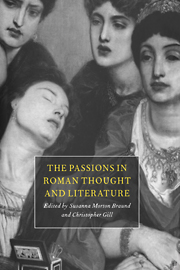Book contents
- Frontmatter
- Contents
- Preface
- Conventions
- Introduction
- 1 Epicurean anger
- 2 Cicero and the expression of grief
- 3 The subjugation of grief in Seneca's Epistles
- 4 A passion unconsoled? Grief and anger in Juvenal Satire 13
- 5 Passion, reason and knowledge in Seneca's tragedies
- 6 Imagination and the arousal of the emotions in Greco-Roman rhetoric
- 7 Pity, fear and the historical audience: Tacitus on the fall of Vitellius
- 8 All in the mind: sickness in Catullus 76
- 9 Ferox uirtus: anger in Virgil's Aeneid
- 10 ‘Envy and fear the begetter of hate’: Statius' Thebaid and the genesis of hatred
- 11 Passion as madness in Roman poetry
- Bibliography
- Index of ancient passages
- General index
2 - Cicero and the expression of grief
Published online by Cambridge University Press: 18 December 2009
- Frontmatter
- Contents
- Preface
- Conventions
- Introduction
- 1 Epicurean anger
- 2 Cicero and the expression of grief
- 3 The subjugation of grief in Seneca's Epistles
- 4 A passion unconsoled? Grief and anger in Juvenal Satire 13
- 5 Passion, reason and knowledge in Seneca's tragedies
- 6 Imagination and the arousal of the emotions in Greco-Roman rhetoric
- 7 Pity, fear and the historical audience: Tacitus on the fall of Vitellius
- 8 All in the mind: sickness in Catullus 76
- 9 Ferox uirtus: anger in Virgil's Aeneid
- 10 ‘Envy and fear the begetter of hate’: Statius' Thebaid and the genesis of hatred
- 11 Passion as madness in Roman poetry
- Bibliography
- Index of ancient passages
- General index
Summary
What is not only more wretched, but also more repugnant or more grotesque than a man who is shattered, enfeebled and laid low by distress (aegritudo).
So Cicero wrote in his Tusculans. The intensity of feeling in this rhetorical question is no coincidence. Cicero knew from personal experience the devastating effect of one particular form of distress – that is grief, by which I mean the pain felt at someone's death. Not long before he wrote the Tusculans, Cicero had had to cope with the death of his only daughter, Tullia. So when he wrote about grief and the passions in the Tusculans, it was not a subject of merely academic interest to him. This is a point that should be remembered when we read his account of the passions there.
Tullia had died in February 45 shortly after giving birth. For a while Cicero had stayed at the house of his friend Atticus, but, fortunately for us, on 6 March he left and so recommenced his daily correspondence with Atticus. These letters give us a vivid picture of his response to Tullia's death. He tells of the pain he feels as memories gnaw at him, although it is interesting that he never actually reports any memories of his daughter. In fact, after her death, he never once mentions Tullia by name in any of his letters or other writings. Instead, he concentrates on his own suffering and his attempts to ‘cure’ himself.
His grief is something which he has to fight against, a passion that needs to be brought under control. ‘When I am alone all my conversation is with books, but it is interrupted by fits of weeping which I struggle against as best I can.
- Type
- Chapter
- Information
- The Passions in Roman Thought and Literature , pp. 36 - 47Publisher: Cambridge University PressPrint publication year: 1997
- 9
- Cited by



